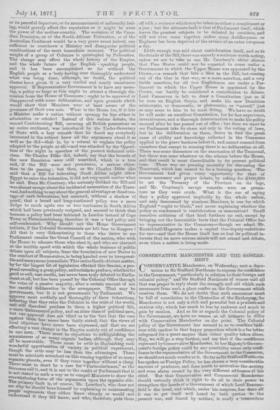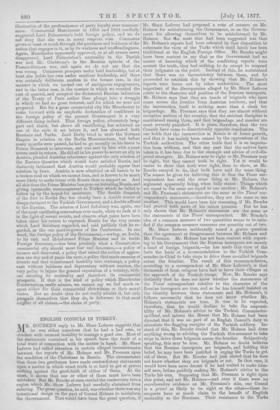CONSERVATIVE MANCHESTER AND THE GOVERN-
CONSERVATIVE Manchester, on Wednesday, sent a depu- tation to Sir Stafford Northcote to express its confidence in the Government, "particularly in relation to their foreign and colonial policy," and Sir Stafford Northcoto of course said all that was proper in reply about the strength and aid which such assurances from such a place confer on the Government which receives them. We do not doubt that such assurances must he full of consolation to the Chancellor of the Exchequer4or Manchester is not only a rich and powerful but a prudentiand anxious city, which has much to lose by rashness and much to gain by caution. And so far as regards the Colonial policy of the Government, we have no reason at all hitherto to differ with Conservative Manchester on the point. The Colonial policy of the Government has seemed to us to combine 'bold- ness with caution in that happy proportion which is a far better safeguard for a great empire than either quality taken alone. Nay, we will go a step further, and say that if the confidence expressed by Conservative Manchester, in her Majesty's Govern- ment's foreign policy could by any possibility mean only confi- dence in the representative of the Government in the Commons, we should not much wonder at it. So far as Sir Stafford Northcote has spoken on Foreign Policy, he has shown a very considerable amount of prudence, and done much to neutralise the anxiety and oven alarm caused by the very different addresses-Of his chief. But that Conservative and Commercial Mattchtster should seriously think it right to do all in their power to strengthen the hands of a Government of which Lord Beacons- field is the head, and which, under his auspices, has .done all it can to get itself well hated by both parties 'to the present war, and feared by neither, is really a trettendous illustration of the predominance of party loyalty over common- sense. Commercial Manchester in 1853 and 1854 cordially supported. Lord Palnaerston's bold foreign policy, and we do not deny that she was in many respects wise. Commerce grows at least as much through the greatness and boldness of the nation that engages in it, as by its wariness and unoffendingness. Again, Manchester apparently approved, or at all events never disapproved, Lord Palmerston's neutrality in the Danish war and Mr. Gladstone's in the Russian episode of the Franco-German war, and again we do not say that she was wrong. Commerce prospers under bold leadership, but at least she holds her own under cautious leadership, and there was certainly deliberate caution in the former case, in the manner in which we backed out of ambiguous engagements, and in the latter case, in the manner in which we counted the cost of quarrel, and accepted the dictatorial Russian infraction of the Treaty of Paris rather than plunge into a struggle in which we had no great interest, and for which we were not prepared. But for a great commercial city like Manchester to come forward with an emphatic declaration of confidence in the foreign policy of the present Government is a very different thing indeed. That foreign policy, alternately brag- gart and timid, but above all vaccillating, has achieved no one of the ends it sot before it, and has alienated both Russians and Turks. Lord Derby tried to snub the German Empire in relation to the Berlin Memorandum, but before many months were passed, he had to go morally on his knees to Prince Bismarck to intervene, and was met by him with a most severe snub in return. He did all in his power to secure an ally in Austria, pleaded Austrian reluctance against the only solution of the Eastern Question which would have satisfied Russia, and distinctly intimated that Austria would probably oppose that solution by force. Austria is now admitted on all hands to be a broken reed on which we cannot lean, and is known to be much more likely to make terms with Russia than to support us. And all this time the Prime Minister has gone on irritating Russia, and giving spasmodic encouragement to Turkey which he failed to follow up by the hoped-for assistance. The double despatch of the fleet to Besika Bay has clearly been a double source of disappointment to the Turkish Government, and a double affront to the Russian. The mission of Lord Salisbury was, again, one of the most vacillating concessions ever made, when we look at it in the light of recent events, and observe what pains have been taken since his return to reproach Russia for the very course which Lord Salisbury regarded, and said publicly that he re- garded, as the one motive-power of the Conference. In one word, the foreign policy of the Government,—owing, no doubt, to its rash and ill-informed Prime Minister and its feeble Foreign Secretary,—has been precisely what a Conservative commercial city should most fear and denounce,—a policy of bounce and disavowal, a policy that raised the notion of aggres- sion one day and of panic the next, a policy that made enemies of friends and that traneformod hostility into contempt, a policy rash without boldness and deprecatory without caution, the very policy to injure the general reputation of a country, with- out securing its neutrality and therefore its commercial prospects. If that is the kind of policy which Manchester Conservatives really admire, we cannot say we feel much re- spect either for their commercial shrewdness or their moral tastes. But no doubt they do not really admire it, but only persgade themselves that they do, in deference to that most exigent of all claims,—the claim of party.



































 Previous page
Previous page